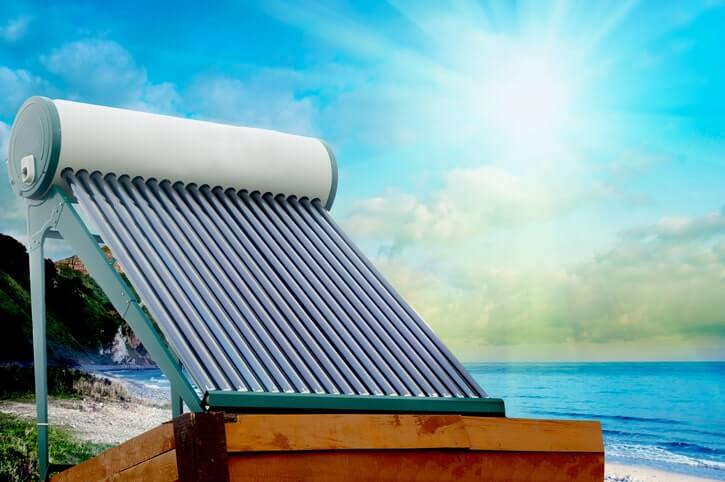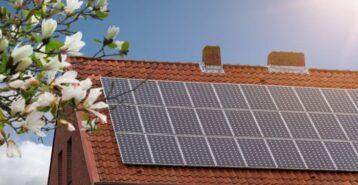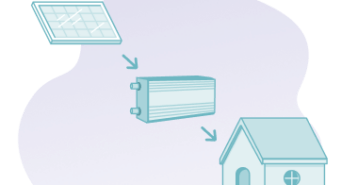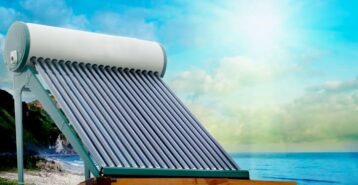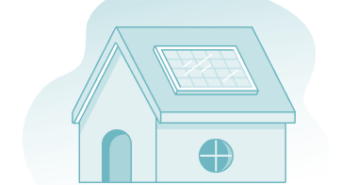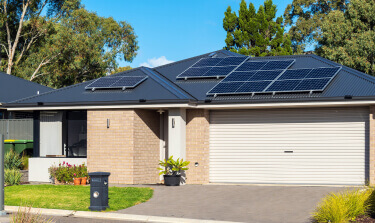Solar Heater Types and Costs
There are three main types of solar heaters for the home: Solar water, pool, and air heaters. The first two types of solar heaters are meant to heat water at home, while solar air heaters can serve as replacements for traditional gas-based heating systems. Let’s look at solar home heating costs by heater type.
Solar Water Heaters
Solar water heaters use energy from the sun to heat water stored in a tank, either directly or through a heat-transfer fluid. Costs range from $3,000 to $9,000 depending on the size of the system, collector type, and installation needs. These systems can cut your water heating bills by 50% to 80% and usually pay for themselves within 4 to 9 years, especially with federal tax credits and local rebates. They’re most efficient in sunny regions and ideal for households with high hot water use.
- What to Know: Can save you, on average, 50-80% on your water heating bills
- Average Cost: $3,000 to $9,000
- Pros: Low maintenance, useful in any climate, pays for itself over time
- Cons: Requires a back-up storage tank
- Best for: Homeowners in sunny climates who use a lot of hot water and want to reduce their utility bills
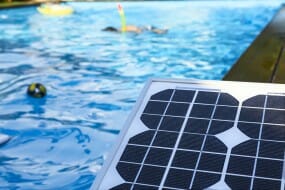
Solar Pool Heaters
Solar pool heaters circulate pool water through solar collectors, where it’s warmed by the sun before returning to the pool. Installation typically costs between $2,500 and $7,000, depending on pool size, panel type, and whether the system is roof- or ground-mounted. While they take longer to heat water than gas or electric heaters, solar systems have the lowest operating costs and can extend your swim season for little to no monthly expense. They’re best suited for homeowners in sunny climates who use their pool regularly.
- What to Know: Cost about the same as a gas heater or heat pump
- Average Cost: $2,500 to $7,000
- Pros: Can heat a pool by 8 to 12 degrees, pays for itself over time
- Cons: Slower heating times, roof space needed for solar panels
- Best for: Homeowners who use their pool regularly across multiple seasons

Solar Air Heaters
Solar air heaters pull in outdoor or indoor air, pass it through a sun-warmed collector, and release it into the home as heated air. These systems cost between $400 and $3,000 depending on size and whether they’re installed for a single room or whole-home use. They’re a great way to offset heating costs in the winter, especially in sunny, cold-weather regions. While not designed to replace a central heating system, they can lower traditional energy use by 30% to 40%, often recouping costs in just a few heating seasons.
- What to Know: Provides additional (or sole) heating for a specific room or rooms
- Average Cost: $400 to $3,000
- Pros: Some models are great for DIY installation, pays for itself in 4 to 7 years
- Cons: Limited heating capacity, sunlight dependency
- Best for: Homeowners in sunny, cold climates who want to reduce winter heating costs
Cost of Solar Heating: What to Expect
Choosing a solar heating system involves more than just buying the collector. You’ll want to consider equipment, labor, efficiency, and maintenance, all of which influence total project cost. Costs vary depending on system size, collector type (flat plate, evacuated tube, glazed/un-glazed), and location-based labor and material rates.
Installation & Labor
Hiring a solar pro typically costs around $70 per hour, with most solar heating installations taking 1 to 3 days. That usually adds $1,000 to $3,500 to your project, depending on system complexity, the need for custom mounting, and local labor rates.
Equipment & Collector Type
- Water heaters average: $1,780 to $5,722 total installed ($3,700 on average)
- Pool heaters range from $2,500 to $7,000, depending on glazed vs unglazed collector choice
- Solar air heaters vary from $400 (single-room unit) up to $3,000 for whole-house systems
Operational Costs & Maintenance
Solar systems have very low running costs. Water heaters use a small pump (around $50/year), and antifreeze replacements may be needed every 3 to 5 years. Pool and air heaters consume only pump or fan electricity. Expect minor maintenance, like inspections or cleanings, over a 20 to 30 year lifespan.
Efficiency & System Size
Sizing matters: Larger systems and more efficient collectors warm water faster but cost more upfront. Seasonality and sunlight exposure also affect performance. More sun means smaller, cheaper systems for the same result.
Regional Cost Differences
See the table below for average solar home heating costs by U.S. region.
| Region | Solar Water Heater | Solar Pool Heater | Solar Air Heater |
|---|---|---|---|
| Northeast | $4,000 - $7,000 | $3,000 - $8,000 | $1,000 - $3,500 |
| Southeast | $3,000 - $6,000 | $2,500 - $7,000 | $700 - $2,500 |
| Midwest | $3,000 - $6,500 | $2,500 - $6,500 | $800 - $2,800 |
| Southwest | $3,000 - $6,000 | $2,500 - $7,000 | $700 - $2,500 |
| West Coast | $4,500 - $8,000 | $3,500 - $9,000 | $1,200 - $3,500 |
| National Average | $3,000 - $9,000 | $2,500 - $7,000 | $400 - $3,000 |
What Else to Know
- Your most accurate cost estimates will always come from local contractors. Getting multiple detailed quotes helps you compare services and prices effectively.
- Make sure estimates break out components, labor, and system specs so there are no pricing surprises.
Reduce Your Solar Home Heating Costs With Incentives
Both federal and state rebates exist for solar heating systems. Taking full advantage of them can make your project much more affordable.
Federal Tax Credit
The Residential Clean Energy Credit currently allows you to claim 30% of your professionally installed solar heating system, whether it’s for water, pool, or air, on your federal taxes. This can significantly lower your upfront cost (for example, reducing an $8,000 system to $5,600).
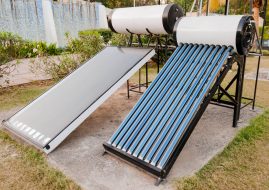
State-Level Incentives
Each state offers different programs. In Arizona, for instance, homeowners can claim a 25% credit (up to $1,000) on qualifying solar heating installations . Meanwhile, other states may offer performance-based rebates (like Scottsdale’s 75¢/kWh energy-saved rebate) or modest tax credits. Always check with your local utility or energy office for current offerings.
Why It Matters
Subtract these incentives when calculating your system cost. They can dramatically reduce what you pay out of pocket and improve your payback timeline.
Additional Benefits of Solar Heating Systems
Helping the Environment
- Reduces the reliance on fossil fuels by replacing traditional gas or electric water heaters.
- Contributes to cleaner, more eco-friendly energy, lowering your carbon footprint over time.
Increased Home Equity
- Solar water heaters can increase your home’s value by up to 25%.
- Even if you plan to sell within a decade, you can recoup a portion of the system’s cost through a higher resale price.
- Enjoy long-term savings on utility bills while also boosting your home’s market appeal.
Is the Cost of Solar Home Heating Worth It?
When considering solar heating, it’s important to weigh the upfront costs against long-term savings. The average installation cost ranges from $3,500 to $7,000, with an average family saving about $280 annually on utility bills. After factoring in the 30% federal tax credit, your cost could drop to around $3,325.
Over the system’s expected 20-year lifespan, you could save $200 per year on average, totaling $4,000 in savings. Of course, your actual savings will depend on factors like water usage, location, and available incentives.
Compare top-rated solar pros in your area.
Read real homeowner reviews, explore qualifications, and view promotions. Modernize makes it easy to browse professionals and find one that will be perfect for your project.
